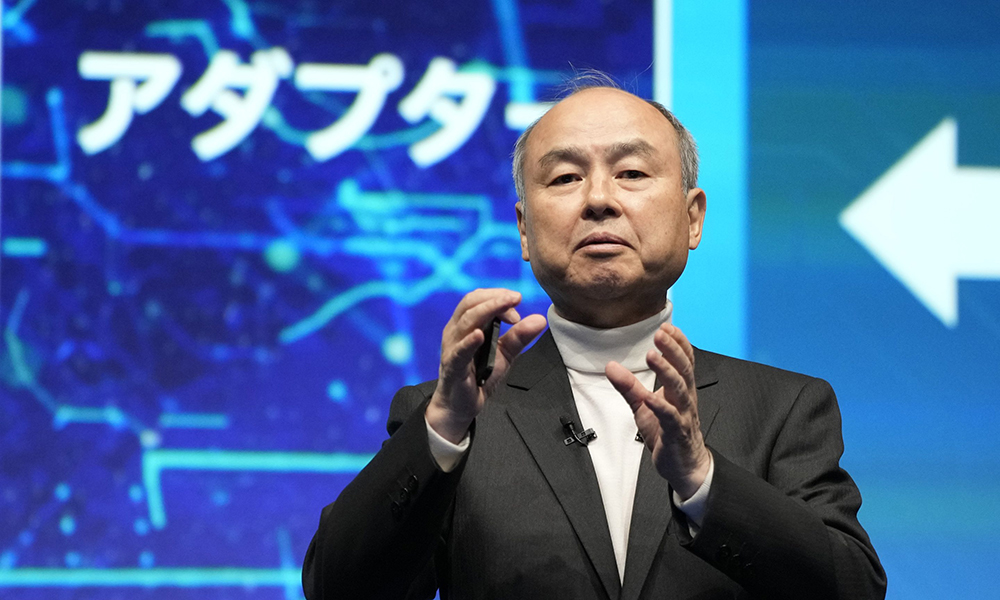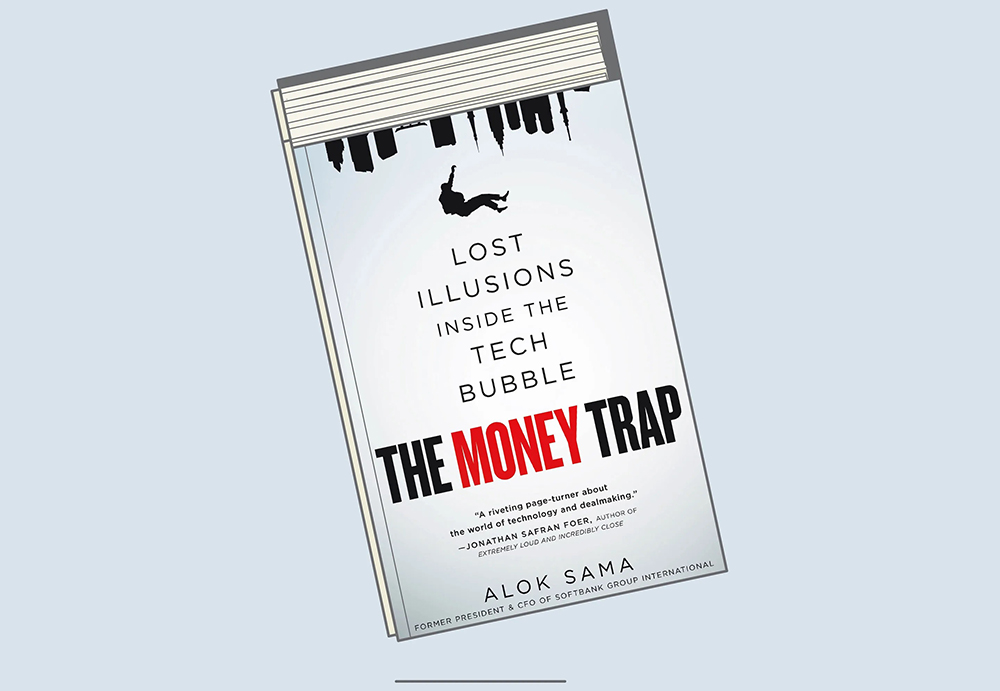
摩根士丹利的資深銀行家阿洛克·薩馬認(rèn)為自己無所不知。然后,,他發(fā)現(xiàn)自己成了世界上最具影響力的科技投資者——軟銀的首席交易員,。軟銀是Arm Holdings、雅虎(Yahoo),、英偉達(Nvidia),、TikTok、優(yōu)步(Uber),、T-Mobile,、阿里巴巴(Alibaba)和WeWork的投資者。
《金錢陷阱》是薩馬與軟銀標(biāo)志性創(chuàng)始人孫正義的個人冒險之旅,。孫正義是一位特立獨行的人,,他希望人們記住他是“押注未來的瘋子”。
以下節(jié)選描述了薩馬與孫正義的第一次會面,。前谷歌(Google)首席商務(wù)官尼科什·阿羅拉(Nikesh Arora)剛剛加入軟銀擔(dān)任總裁,希望薩馬來當(dāng)他的學(xué)徒,。當(dāng)時阿里巴巴剛剛上市,,軟銀的2000萬美元投資如今價值超過500億美元。孫正義意氣風(fēng)發(fā),,而薩馬剛剛乘坐英國航空公司的007號航班從倫敦抵達,,“對于一個肩負(fù)使命的人來說,這再合適不過了”,。

“我聽說你是個聰明人,?!睂O正義說道,并邀請我坐在他的對面。
這句話一半是陳述,,一半是提問,,言下之意是我要證明這一觀點。在午餐時間,,我有一個小時的時間向一個被公認(rèn)為天才的人證明我是個“聰明人”,。
孫正義的私人餐廳俯瞰著風(fēng)景秀麗的濱離宮庭園,遠(yuǎn)處是東京灣,。低頭看是水池和綠地,,抬頭看是藍(lán)天,令人心曠神怡,。大部分空間都用來建造一個精美的傳統(tǒng)日本花園,,旁邊還有一個開放的亭子,展示著孫正義珍貴的書法收藏品,。餐桌是傳統(tǒng)的“掘式被爐”桌型,,低矮,地板下凹,,這是為了照顧那些不習(xí)慣盤腿而坐的外國人,。
盡管室內(nèi)溫度被調(diào)得讓人窒息,但孫正義還是在棕色羊毛夾克里穿了一件栗色的羊絨衫,。我則穿著全套高管制服,,包括一件穿舊了的、帶有法國袖口的名牌襯衫,,上面的圖案顯得很浮夸,。我請求孫正義允許我脫下西裝外套。
孫正義的貼身男仆加藤先生悄無聲息地走進房間,,穿著黑色西裝,、白色襯衫,打著緊身黑領(lǐng)帶,,看起來像個職業(yè)殺手,。他從一瓶打開的雷司令葡萄酒里倒出一杯酒,用無可挑剔的英語問我是否喜歡紅酒,,并展示了一瓶未開封的勃艮第紅酒,。當(dāng)我看到“拉塔希園”這個標(biāo)簽時,我露出不可置信的表情,。每瓶5000多美元,,即使是最充裕的開支賬目也難以承受。這酒很誘人,,但我還是聽從了孫正義的建議,,喝了一小杯雅致的雷司令干葡萄酒,。
加藤先生閃身而出,他的進出是一次無懈可擊的秘密行動,。
“孫正義先生,,您早期是如何看待互聯(lián)網(wǎng)的?如果是您,,您會怎么做,?”我問道,試圖讓他開口說話,。
“嗯,,對我來說,互聯(lián)網(wǎng)商業(yè)模式就是那些理論上無限覆蓋,、可變成本為零的平臺,。”孫正義回應(yīng)道,。
這給我留下了深刻印象,,它簡明扼要地描述了互聯(lián)網(wǎng)的顛覆性力量。最成功的科技企業(yè)都是各類“平臺”,,只需極少的資本投入,,而且具有強大的“網(wǎng)絡(luò)效應(yīng)”和“贏家通吃”的動態(tài)。
他繼續(xù)說:“我很早就發(fā)現(xiàn)了這一點,,我知道我們必須進行如此激進的投資,。我唯一的遺憾是我本該投入更多?!?/p>
嗯,。這就像伊卡洛斯希望自己飛得離太陽更近一樣!
軟銀在鼎盛時期的估值為2000億美元,,讓孫正義一度成為世界首富,。但隨后泡沫破裂,孫正義的凈資產(chǎn)急劇縮水95%,,創(chuàng)造了另一種類型的歷史,,并因此被載入《吉尼斯世界紀(jì)錄大全》。因為損失了有史以來最多的錢——750億美元的賬面財富化為烏有,。任何正常人都會因沒有套現(xiàn)而備受煎熬,但對孫正義來說,,“正常人”是最殘酷的侮辱,。
他說:“我想在亞馬遜(Amazon)首次公開募股之前投資。我和貝索斯(Bezos)見了面,,我們幾乎達成了協(xié)議,,以3億美元的估值投資1億美元,。但我的團隊告訴我,我們沒錢,?!彼粲兴嫉卣f?!澳隳芟胂髥??我們本可以擁有亞馬遜20%的股份!”
我輕輕地?fù)u了搖頭,,感到十分敬畏,。到2024年,亞馬遜25%的股份價值將超過3600億美元,。
“孫正義先生,,你在那次股災(zāi)中幾乎失去了一切。感覺如何,?”我繼續(xù)問道,。
他又笑了起來,靠在椅背上,,雙手一攤,。“你知道,,當(dāng)我成為最富有的人的時候,,我總是擔(dān)心如何花錢。然后市場解決了我的問題,。沒什么好擔(dān)心的,,都化為烏有了!”
我說:“但是,,你還有最后的10億呢,!”
我們都笑出了聲。
“是的,,阿洛克,,我知道。但我從不為錢發(fā)愁,,也許這也是人們認(rèn)為我瘋了的原因,。小時候我一無所有,但我很快樂,,即使我失去了一切,,我仍然很快樂?!?/p>
他頓了頓,。
“我的目標(biāo)是讓每個人都幸福,。沒有人應(yīng)該悲傷。我希望科技能讓人們幸福,?!?/p>
軟銀持有的雅虎股份在2000年達到峰值時價值超過300億美元。一系列的管理失誤,,包括2001年錯失以100萬美元收購谷歌的機會,,使這個曾經(jīng)最有價值的虛擬地產(chǎn)的價值銳減。軟銀最終以遠(yuǎn)低于巔峰時期的估值出售了其持股?,F(xiàn)在,,軟銀在阿里巴巴上的集中持股引發(fā)了類似的擔(dān)憂。
“孫正義先生,,你是否考慮出售阿里巴巴的股份,?”我問道。
他那令人解除戒心的笑容消失了,。
他說:“我永遠(yuǎn)不會出售阿里巴巴,。你知道,阿里巴巴擁有80%的市場份額,,并且每年增長25%,。這是一家實力雄厚的公司,非常了不起,。任何認(rèn)為我應(yīng)該出售阿里巴巴的人都是愚蠢的,,他們不明白個中緣由?!?
孫正義是否永遠(yuǎn)愛上了處于青年時期的阿里巴巴,?如果是這樣,就像所有其他科技公司一樣,,阿里巴巴不會永遠(yuǎn)是阿里巴巴,。2000年,他對雅虎是否也有同樣的感覺,?
2006年收購沃達豐日本(Vodafone Japan)的交易在孫正義的成功案例中鮮有提及,,但這次交易卻首屈一指。人們認(rèn)為,,2001年股市崩盤后,,孫正義的東山再起完全是因為阿里巴巴。盡管阿里巴巴取得了驚人的成功,,但在孫正義的財富與比爾·蓋茨(Bill Gates)不相上下的時候,,阿里巴巴的投資規(guī)模僅為2000萬美元。另一方面,,沃達豐日本的交易是在軟銀搖搖欲墜的時候完成的,,需要非凡的膽識、完美的執(zhí)行力和大量現(xiàn)金,。
我問他是否熟悉高爾夫球手維杰·辛格(Vijay Singh),。我曾經(jīng)問過維杰,與泰格·伍茲正面交鋒的壓力如何——維杰經(jīng)常與其交鋒,,而且還取得了勝利,。
“阿洛克,壓力是我口袋里只有20美元,,卻要以每洞100美元的價格與游客打球為生,。”維杰笑著說,,他指的是在家鄉(xiāng)斐濟當(dāng)練習(xí)場職業(yè)選手的日子,。
我說:“孫正義先生,您和沃達豐的交易就是這樣,??诖锎е?0美元,押注100美元,!”
孫正義那雙銳利的黑眼睛閃爍著光芒,,嘴角一直咧到耳根,瞇起眼睛,,對我晃了晃手指,。
他說:“你說得太對了!這太瘋狂了,,但你必須瘋狂才能贏,。你知道瘋子和聰明人打架誰會贏嗎?瘋子總是會贏,!”
接著,,孫正義給我講了他最喜歡的史蒂夫·喬布斯(Steve Jobs)的故事。2005年,,在第一代iPhone發(fā)布之前,,孫正義畫了一張手持設(shè)備的草圖,并把它拿給喬布斯看,,要求蘋果(Apple)將未來“智能手機”在日本的獨家分銷權(quán)授予他。一臉茫然的史蒂夫認(rèn)為這幅畫丑陋不堪,,并沒有把它放在心上,。此外,軟銀并未擁有一家電話公司,。但孫正義堅持不懈,,史蒂夫最終妥協(xié)了,。 “你是個瘋子,但我喜歡你,?!笔返俜蛘f,并表示如果孫正義擁有一家電話公司,,而蘋果有相應(yīng)產(chǎn)品,,就會給他獨家分銷權(quán)。
“每個人都認(rèn)為我瘋了,。沃達豐認(rèn)為我太瘋狂了,,他們甚至借錢給我,讓我從他們手里收購公司,?!睂O正義笑著繼續(xù)說道。
憑借與喬布斯達成的協(xié)議,,孫正義以154億美元(相當(dāng)于軟銀市值的四倍多)的賭注押注沃達豐日本公司,,利用高達90%的杠桿率收購了一家用戶和現(xiàn)金都在流失的公司。喬布斯信守了諾言,,智能手機改變了世界,,而軟銀則實現(xiàn)了投資業(yè)務(wù)史上最偉大的逆轉(zhuǎn)之一,其最初約20億美元的股權(quán)投資在2019年公司上市時價值近420億美元,。
最后,,我總結(jié)了在紐約會談的要點,并闡述了我對孫正義如何通過一系列交易為軟銀在蓬勃發(fā)展的墨西哥電信市場創(chuàng)造有利可圖的業(yè)務(wù)的看法,。
他的臉亮了起來,,瞇起眼睛,笑容達到了最燦爛的程度,,又對我晃了晃手指,。
“你太聰明了,阿洛克,,實在太聰明了,!”
任務(wù)完成。不是因為我說了什么有見地或新意的話,,而是我讓孫正義覺得我理解了他的天才想法,?我還逗笑他了。
孫正義的助理鈴木小姐走了進來,,戴著她那標(biāo)志性的色彩鮮艷的名牌眼鏡,,她的任務(wù)是送來一張令人生疑的空白黃色便利貼。顯然,這是事先安排好的會議需要結(jié)束的提示,。
我們起身時,,孫正義說:“我希望你能加入我們的大家庭?!?/p>
我刻意避免談?wù)擃^銜或報酬等問題,;我想了解一下這個人。我喜歡我看到的,。他很有魅力、風(fēng)趣,、有趣,,但不止于此。雖然他似乎沉迷于為人類謀幸福的宏偉愿景,,但他與我的交流卻非常人性化,。
“孫正義先生,我知道自己能幫您實現(xiàn)愿景,。希望您能給我這個機會,。”我回答道,。
孫正義親自送我走到電梯間,。我背對他走進電梯,進去后轉(zhuǎn)身向他隨意地?fù)]了揮手,。令人尷尬的是,,他雙手放在大腿上,以日本傳統(tǒng)的鞠躬方式鞠躬,。我試圖改變姿態(tài)向他鞠躬,,但為時已晚。電梯門漸漸關(guān)上了,。(財富中文網(wǎng))
摘自阿洛克·薩馬的《金錢陷阱:科技泡沫中的幻境》,。版權(quán)?2024歸作者所有,經(jīng)圣馬丁出版集團授權(quán)再版,。
阿洛克·薩馬(Alok Sama)是軟銀國際集團(SoftBank Group International)前總裁兼首席財務(wù)官,。他曾擔(dān)任摩根士丹利(Morgan Stanley)的董事總經(jīng)理,并在紐約,、舊金山,、倫敦和香港從事金融和技術(shù)工作長達三十多年。
譯者:中慧言-王芳
摩根士丹利的資深銀行家阿洛克·薩馬認(rèn)為自己無所不知,。然后,,他發(fā)現(xiàn)自己成了世界上最具影響力的科技投資者——軟銀的首席交易員。軟銀是Arm Holdings、雅虎(Yahoo),、英偉達(Nvidia),、TikTok、優(yōu)步(Uber),、T-Mobile,、阿里巴巴(Alibaba)和WeWork的投資者。
《金錢陷阱》是薩馬與軟銀標(biāo)志性創(chuàng)始人孫正義的個人冒險之旅,。孫正義是一位特立獨行的人,,他希望人們記住他是“押注未來的瘋子”。
以下節(jié)選描述了薩馬與孫正義的第一次會面,。前谷歌(Google)首席商務(wù)官尼科什·阿羅拉(Nikesh Arora)剛剛加入軟銀擔(dān)任總裁,,希望薩馬來當(dāng)他的學(xué)徒。當(dāng)時阿里巴巴剛剛上市,,軟銀的2000萬美元投資如今價值超過500億美元,。孫正義意氣風(fēng)發(fā),而薩馬剛剛乘坐英國航空公司的007號航班從倫敦抵達,,“對于一個肩負(fù)使命的人來說,,這再合適不過了”。
“我聽說你是個聰明人,?!睂O正義說道,并邀請我坐在他的對面,。
這句話一半是陳述,,一半是提問,言下之意是我要證明這一觀點,。在午餐時間,,我有一個小時的時間向一個被公認(rèn)為天才的人證明我是個“聰明人”。
孫正義的私人餐廳俯瞰著風(fēng)景秀麗的濱離宮庭園,,遠(yuǎn)處是東京灣,。低頭看是水池和綠地,抬頭看是藍(lán)天,,令人心曠神怡,。大部分空間都用來建造一個精美的傳統(tǒng)日本花園,旁邊還有一個開放的亭子,,展示著孫正義珍貴的書法收藏品,。餐桌是傳統(tǒng)的“掘式被爐”桌型,低矮,,地板下凹,,這是為了照顧那些不習(xí)慣盤腿而坐的外國人。
盡管室內(nèi)溫度被調(diào)得讓人窒息,但孫正義還是在棕色羊毛夾克里穿了一件栗色的羊絨衫,。我則穿著全套高管制服,,包括一件穿舊了的、帶有法國袖口的名牌襯衫,,上面的圖案顯得很浮夸,。我請求孫正義允許我脫下西裝外套。
孫正義的貼身男仆加藤先生悄無聲息地走進房間,,穿著黑色西裝,、白色襯衫,打著緊身黑領(lǐng)帶,,看起來像個職業(yè)殺手,。他從一瓶打開的雷司令葡萄酒里倒出一杯酒,用無可挑剔的英語問我是否喜歡紅酒,,并展示了一瓶未開封的勃艮第紅酒。當(dāng)我看到“拉塔希園”這個標(biāo)簽時,,我露出不可置信的表情,。每瓶5000多美元,即使是最充裕的開支賬目也難以承受,。這酒很誘人,,但我還是聽從了孫正義的建議,喝了一小杯雅致的雷司令干葡萄酒,。
加藤先生閃身而出,,他的進出是一次無懈可擊的秘密行動。
“孫正義先生,,您早期是如何看待互聯(lián)網(wǎng)的,?如果是您,您會怎么做,?”我問道,,試圖讓他開口說話。
“嗯,,對我來說,,互聯(lián)網(wǎng)商業(yè)模式就是那些理論上無限覆蓋、可變成本為零的平臺,?!睂O正義回應(yīng)道。
這給我留下了深刻印象,,它簡明扼要地描述了互聯(lián)網(wǎng)的顛覆性力量,。最成功的科技企業(yè)都是各類“平臺”,只需極少的資本投入,而且具有強大的“網(wǎng)絡(luò)效應(yīng)”和“贏家通吃”的動態(tài),。
他繼續(xù)說:“我很早就發(fā)現(xiàn)了這一點,,我知道我們必須進行如此激進的投資。我唯一的遺憾是我本該投入更多,?!?/p>
嗯。這就像伊卡洛斯希望自己飛得離太陽更近一樣,!
軟銀在鼎盛時期的估值為2000億美元,,讓孫正義一度成為世界首富。但隨后泡沫破裂,,孫正義的凈資產(chǎn)急劇縮水95%,,創(chuàng)造了另一種類型的歷史,并因此被載入《吉尼斯世界紀(jì)錄大全》,。因為損失了有史以來最多的錢——750億美元的賬面財富化為烏有,。任何正常人都會因沒有套現(xiàn)而備受煎熬,但對孫正義來說,,“正常人”是最殘酷的侮辱,。
他說:“我想在亞馬遜(Amazon)首次公開募股之前投資。我和貝索斯(Bezos)見了面,,我們幾乎達成了協(xié)議,,以3億美元的估值投資1億美元。但我的團隊告訴我,,我們沒錢,。”他若有所思地說,?!澳隳芟胂髥幔课覀儽究梢該碛衼嗰R遜20%的股份,!”
我輕輕地?fù)u了搖頭,,感到十分敬畏。到2024年,,亞馬遜25%的股份價值將超過3600億美元,。
“孫正義先生,你在那次股災(zāi)中幾乎失去了一切,。感覺如何,?”我繼續(xù)問道。
他又笑了起來,,靠在椅背上,,雙手一攤,。“你知道,,當(dāng)我成為最富有的人的時候,,我總是擔(dān)心如何花錢。然后市場解決了我的問題,。沒什么好擔(dān)心的,,都化為烏有了!”
我說:“但是,,你還有最后的10億呢,!”
我們都笑出了聲。
“是的,,阿洛克,,我知道。但我從不為錢發(fā)愁,,也許這也是人們認(rèn)為我瘋了的原因,。小時候我一無所有,但我很快樂,,即使我失去了一切,,我仍然很快樂?!?/p>
他頓了頓。
“我的目標(biāo)是讓每個人都幸福,。沒有人應(yīng)該悲傷,。我希望科技能讓人們幸福?!?/p>
軟銀持有的雅虎股份在2000年達到峰值時價值超過300億美元,。一系列的管理失誤,包括2001年錯失以100萬美元收購谷歌的機會,,使這個曾經(jīng)最有價值的虛擬地產(chǎn)的價值銳減,。軟銀最終以遠(yuǎn)低于巔峰時期的估值出售了其持股。現(xiàn)在,,軟銀在阿里巴巴上的集中持股引發(fā)了類似的擔(dān)憂,。
“孫正義先生,你是否考慮出售阿里巴巴的股份,?”我問道,。
他那令人解除戒心的笑容消失了。
他說:“我永遠(yuǎn)不會出售阿里巴巴,。你知道,,阿里巴巴擁有80%的市場份額,,并且每年增長25%。這是一家實力雄厚的公司,,非常了不起,。任何認(rèn)為我應(yīng)該出售阿里巴巴的人都是愚蠢的,他們不明白個中緣由,?!?
孫正義是否永遠(yuǎn)愛上了處于青年時期的阿里巴巴?如果是這樣,,就像所有其他科技公司一樣,,阿里巴巴不會永遠(yuǎn)是阿里巴巴。2000年,,他對雅虎是否也有同樣的感覺,?
2006年收購沃達豐日本(Vodafone Japan)的交易在孫正義的成功案例中鮮有提及,但這次交易卻首屈一指,。人們認(rèn)為,,2001年股市崩盤后,孫正義的東山再起完全是因為阿里巴巴,。盡管阿里巴巴取得了驚人的成功,,但在孫正義的財富與比爾·蓋茨(Bill Gates)不相上下的時候,阿里巴巴的投資規(guī)模僅為2000萬美元,。另一方面,,沃達豐日本的交易是在軟銀搖搖欲墜的時候完成的,需要非凡的膽識,、完美的執(zhí)行力和大量現(xiàn)金,。
我問他是否熟悉高爾夫球手維杰·辛格(Vijay Singh)。我曾經(jīng)問過維杰,,與泰格·伍茲正面交鋒的壓力如何——維杰經(jīng)常與其交鋒,,而且還取得了勝利。
“阿洛克,,壓力是我口袋里只有20美元,,卻要以每洞100美元的價格與游客打球為生?!本S杰笑著說,,他指的是在家鄉(xiāng)斐濟當(dāng)練習(xí)場職業(yè)選手的日子。
我說:“孫正義先生,,您和沃達豐的交易就是這樣,。口袋里揣著20美元,,押注100美元,!”
孫正義那雙銳利的黑眼睛閃爍著光芒,,嘴角一直咧到耳根,瞇起眼睛,,對我晃了晃手指,。
他說:“你說得太對了!這太瘋狂了,,但你必須瘋狂才能贏,。你知道瘋子和聰明人打架誰會贏嗎?瘋子總是會贏,!”
接著,,孫正義給我講了他最喜歡的史蒂夫·喬布斯(Steve Jobs)的故事。2005年,,在第一代iPhone發(fā)布之前,,孫正義畫了一張手持設(shè)備的草圖,并把它拿給喬布斯看,,要求蘋果(Apple)將未來“智能手機”在日本的獨家分銷權(quán)授予他,。一臉茫然的史蒂夫認(rèn)為這幅畫丑陋不堪,并沒有把它放在心上,。此外,,軟銀并未擁有一家電話公司。但孫正義堅持不懈,,史蒂夫最終妥協(xié)了,。 “你是個瘋子,但我喜歡你,?!笔返俜蛘f,并表示如果孫正義擁有一家電話公司,,而蘋果有相應(yīng)產(chǎn)品,就會給他獨家分銷權(quán),。
“每個人都認(rèn)為我瘋了,。沃達豐認(rèn)為我太瘋狂了,他們甚至借錢給我,,讓我從他們手里收購公司,。”孫正義笑著繼續(xù)說道,。
憑借與喬布斯達成的協(xié)議,,孫正義以154億美元(相當(dāng)于軟銀市值的四倍多)的賭注押注沃達豐日本公司,利用高達90%的杠桿率收購了一家用戶和現(xiàn)金都在流失的公司,。喬布斯信守了諾言,,智能手機改變了世界,,而軟銀則實現(xiàn)了投資業(yè)務(wù)史上最偉大的逆轉(zhuǎn)之一,其最初約20億美元的股權(quán)投資在2019年公司上市時價值近420億美元,。
最后,,我總結(jié)了在紐約會談的要點,并闡述了我對孫正義如何通過一系列交易為軟銀在蓬勃發(fā)展的墨西哥電信市場創(chuàng)造有利可圖的業(yè)務(wù)的看法,。
他的臉亮了起來,,瞇起眼睛,笑容達到了最燦爛的程度,,又對我晃了晃手指,。
“你太聰明了,阿洛克,,實在太聰明了,!”
任務(wù)完成。不是因為我說了什么有見地或新意的話,,而是我讓孫正義覺得我理解了他的天才想法,?我還逗笑他了。
孫正義的助理鈴木小姐走了進來,,戴著她那標(biāo)志性的色彩鮮艷的名牌眼鏡,,她的任務(wù)是送來一張令人生疑的空白黃色便利貼。顯然,,這是事先安排好的會議需要結(jié)束的提示,。
我們起身時,孫正義說:“我希望你能加入我們的大家庭,?!?/p>
我刻意避免談?wù)擃^銜或報酬等問題;我想了解一下這個人,。我喜歡我看到的,。他很有魅力、風(fēng)趣,、有趣,,但不止于此。雖然他似乎沉迷于為人類謀幸福的宏偉愿景,,但他與我的交流卻非常人性化,。
“孫正義先生,我知道自己能幫您實現(xiàn)愿景,。希望您能給我這個機會,。”我回答道,。
孫正義親自送我走到電梯間,。我背對他走進電梯,,進去后轉(zhuǎn)身向他隨意地?fù)]了揮手。令人尷尬的是,,他雙手放在大腿上,,以日本傳統(tǒng)的鞠躬方式鞠躬。我試圖改變姿態(tài)向他鞠躬,,但為時已晚,。電梯門漸漸關(guān)上了。(財富中文網(wǎng))
摘自阿洛克·薩馬的《金錢陷阱:科技泡沫中的幻境》,。版權(quán)?2024歸作者所有,,經(jīng)圣馬丁出版集團授權(quán)再版。
阿洛克·薩馬(Alok Sama)是軟銀國際集團(SoftBank Group International)前總裁兼首席財務(wù)官,。他曾擔(dān)任摩根士丹利(Morgan Stanley)的董事總經(jīng)理,,并在紐約、舊金山,、倫敦和香港從事金融和技術(shù)工作長達三十多年,。
譯者:中慧言-王芳
Veteran Morgan Stanley banker Alok Sama thought he had seen it all. Then he found himself chief dealmaker at the most influential technology investor in the world—SoftBank, the backer of Arm Holdings, Yahoo, Nvidia, TikTok, Uber, T-Mobile, Alibaba, and WeWork.
The Money Trap is Sama’s personal odyssey alongside Softbank’s iconic founder Masayoshi Son, the maverick who wanted to be remembered as “the crazy guy who bet on the future.”
The following excerpt describes Sama’s first meeting with Son. Nikesh Arora, formerly Google’s chief business officer, had just joined as Softbank’s president and wanted Sama to come in as his apprentice. Alibaba had just gone public, and SoftBank’s $20 million investment is now worth over $50 billion. Son is riding high, and Sama has just arrived from London on British Airways flight 007, “apropos for a man on a mission.”
“So, I have heard you are a smart guy,” said Masa, inviting me to take a seat across from him.
It was a half statement, half question, the implication being I had a point to prove. I had one hour, over lunch, to establish my credentials as a “smart guy” to a man widely regarded as a genius.
Masa’s private dining room overlooked the scenic Hamarikyu Gardens, with Tokyo Bay beyond. Water and greenery below, blue sky above, a pleasing combination. Much of the space was given to an exquisite traditional Japanese garden, an adjacent open pavilion displaying Masa’s priceless calligraphy collection. The dining table was a traditional horigatsu, low to the ground with recessed floor beneath, a concession to gaijin uncomfortable sitting cross-legged.
Masa wore a maroon cashmere sweater under a brown woolen blazer, despite the temperature set suffocatingly high. I was in full executive battle attire, including the risible pomposity of a well-worn monogrammed shirt with French cuffs. I requested Masa’s permission to remove my suit jacket.
Masa’s valet Kato-san glided into the room, attired assassin-like in black suit, white shirt and skinny black tie, and offered a pour from an open bottle of Riesling. In impeccable English, he asked if I’d prefer red wine instead, displaying an unopened red Burgundy bottle. I did a double take when I saw the label—La Tache. At over $5,000 a bottle, out of reach for even the most inflated expense accounts. Tempting, but I followed Masa’s lead and accepted a small pour of the exquisite dry Riesling.
Kato-san shimmered out, his entry and exit an impeccably executed stealth operation.
“Son-san, how did you think about the internet in the early days, and what would you have done differently?” I asked, trying to get him talking.
“Well, the internet business model for me was all about platforms with theoretically infinite reach at zero variable cost,” Masa responded.
This struck me as a succinct description of the disruptive power of the internet. The most successful technology businesses are “platforms” requiring minimal capital investment, with strong “network effects” and a “winner take most” dynamic.
“I saw this very early, and I knew we had to invest so aggressively,” he continued. “My only regret is I should have invested even more.”
Hmmm. This is like Icarus wishing he’d flown closer to the sun!
At its peak, SoftBank was valued at $200 billion, briefly making Masa the richest person in the world. But then the bubble burst, and Masa’s net worth declined by a precipitous 95%, making a different type of history and earning him a citation in the Guinness Book of World records. For losing the most money ever —an evisceration of $75 billion of paper wealth. Any normal person would be tormented by not cashing out, but for Masa “normal” was the cruelest insult.
“I wanted to invest in Amazon before the IPO,” he said. “I met with Bezos, and we almost agreed a deal, to invest $100 million at a $300 million valuation. But my team told me we didn’t have the money,” he said, wistfully. “Can you imagine? We could have owned maybe 20% of Amazon!”
I shook my head gently, appropriately awed. Twenty-five percent of Amazon would be worth over $360 billion in 2024.
“Son-san, you lost almost everything in the crash. How did that feel?” I continued.
He laughed again, leaning back and throwing up his hands. “You know, when I became the richest man, I worried all the time about how to spend my money. And then the market solved my problem. Nothing to worry about, all gone!”
“But Masa,” I said, “you still had your last billion!”
We both laughed out loud.
“Yes, yes I know, Alok. But I never worry about money, maybe also why people think I’m crazy. As a child I had nothing and I was so happy, if I lose everything I am still happy.”
He paused.
“My goal is happiness for everyone. Nobody should be sad. I want technology to make people happy.”
SoftBank’s stake in Yahoo! was worth over $30 billion at its peak in 2000. A series of management blunders, including a missed opportunity to buy Google for $1 million in 2001, decimated the value of what was once the most valuable virtual real estate. SoftBank eventually sold its stake at a fraction of the peak valuation. Now, SoftBank’s concentrated Alibaba position raised similar concerns.
“Masa, are you considering selling Alibaba shares?” I asked.
His disarming smile disappeared.
“I will never sell Alibaba,” he said. “You know, they have 80% market share, and growing 25% annually. It is a fantastic company, fantastic. Anyone who thinks I should sell is stupid, they don’t understand.”
Had Masa fallen forever in love with the young Alibaba? If so, like every other technology company, Alibaba would not remain Alibaba forever. Had he felt the same way about Yahoo! in 2000?
The 2006 takeover of Vodafone Japan rarely gets a mention in Masa’s hit parade, but tops anything is his repertoire. People assume Masa’s comeback after the 2001 market implosion was all about Alibaba. While insanely successful, Alibaba was a modest $20 million punt at a time when Masa was in Bill Gates’ wealth post code. The Vodafone Japan deal, on the other hand, was executed at a time when SoftBank was tottering, required extraordinary chutzpah, flawless execution and a ton of cash.
I asked Masa if he was familiar with golfer Vijay Singh. I once asked Vijay about the pressure of going head-to-head against Tiger—as Vijay often did and won.
“Alok, pressure is trying to make a living playing tourists for $100 a hole with $20 in my pocket,” said Vijay, laughing, referring to his days as a driving range pro in his native Fiji.
“Masa,” I said, “your Vodafone deal was like that. Betting $100 with $20 in your pocket!”
Masa’s piercing black eyes lit up, and with a smile now extending all the way to his ears, his eyes crinkled as he wagged a finger at me.
“You are so right!” he said. “That was crazy, but you have to be crazy to win. You know who win in a fight between a crazy guy and a smart guy? The crazy guy always win!”
Masa then told me his favourite Steve Jobs story. In 2005—before the launch of the first iPhone—Masa made a crude sketch of a handheld device and took it to Jobs, demanding exclusive Japanese distribution rights for Apple’s future “smartphone.” A bemused Steve dismissed the drawing as ugly. Besides, SoftBank didn’t own a phone company. But Masa persisted, and Steve eventually relented. “You’re a crazy guy, but I like you,” said Steve, giving Masa an exclusive if and when he owned a phone company and Apple had a product.
“Everybody thought I was crazy. Vodafone thought I was so crazy, they even lent me money to buy the company from them,” Masa continued, laughing.
On the strength of the Jobs handshake, Masa wagered $15.4 billion—more than four times the value of SoftBank—on Vodafone Japan, using 90% leverage to buy a company bleeding subscribers and cash. Jobs kept his word, smartphones changed the world, and SoftBank engineered one of the great turnarounds in the history of the investment business, its initial equity investment of circa $2 billion worth almost $42 billion when the company went public in 2019.
In closing, I summarized the takeaways from my meetings in New York, and laid out my thoughts on how Masa might engineer a sequence of deals to create a profitable business for SoftBank in the burgeoning Mexican telecommunications market.
His face lit up, the eyes crinkled, the smile reached its widest, and the finger wagged at me again.
“You are so smart, Alok, so smart!”
Mission accomplished. Not because I said anything insightful or original, but perhaps I made Masa feel I understood his brand of genius? And I made him laugh.
Masa’s assistant Suki-san entered, sporting her trademark brightly colored designer spectacles, her mission to deliver a suspiciously blank yellow Post-it note. Evidently a pre-arranged cue that the meeting needed to end.
“I hope you will join our family,” said Masa, as we rose.
I had steered clear of discussion about titles or compensation; I wanted to get the measure of the man. I liked what I saw. He was charming and funny and interesting, but there was more. While seemingly obsessed with grandiose visions of happiness for humanity, he connected with me at a very human level.
“I know I can help you achieve your vision Son-san. I hope you will give me the opportunity,” I responded.
Masa personally escorted me to the elevator bank. I turned my back to him and entered the elevator, and once inside pivoted toward him with a casual wave. Embarrassingly, he was bowing in the formal Japanese fashion, hands on his thighs. I tried to switch gears and bow, but it was too late. The elevator doors were drawing shut.
From The Money Trap: Lost Illusions Inside the Tech Bubble by Alok Sama. Copyright ? 2024 by the author and reprinted by permission of St. Martin’s Publishing Group.
Alok Sama is the former President & CFO of SoftBank Group International. He previously served as a Managing Director at Morgan Stanley, and has worked in finance and technology for over thirty years in New York, San Francisco, London and Hong Kong.






